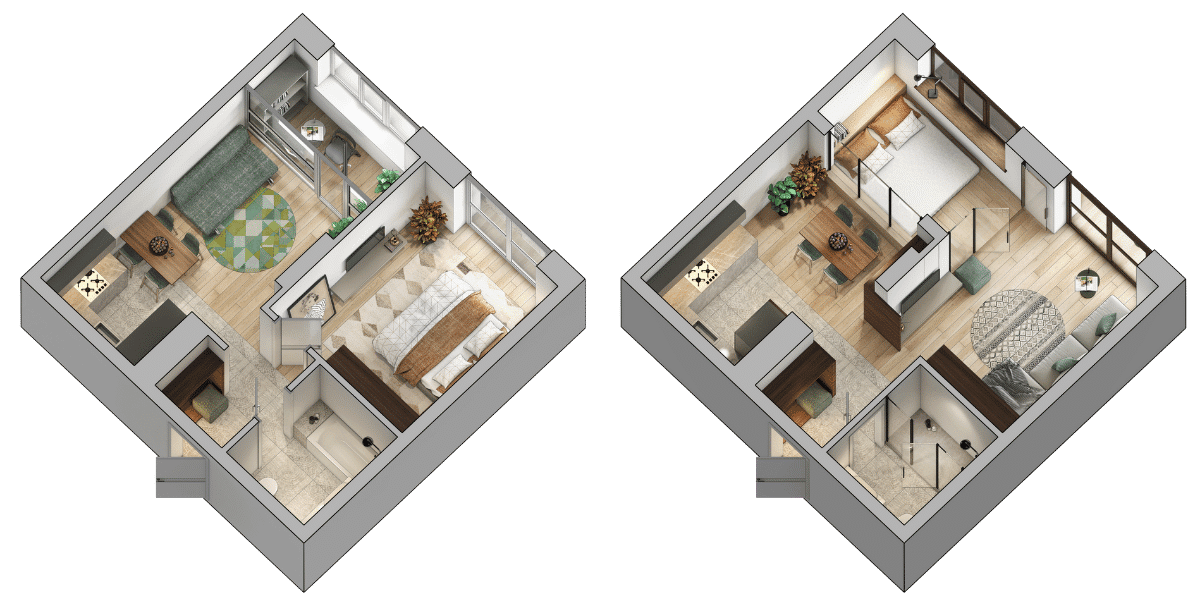Moving into your first apartment is an exciting milestone, but it can also come with its share of challenges. Once you’ve signed the lease, it’s time to get organized and prepare for the transition. Whether you’re managing the move on your own or enlisting the help of professionals, having a solid plan and knowing a few key tips can help make the process smoother. Below are 12 practical tips to help you settle into your new space with ease.
1. Save Enough Money for the Move
Moving can be costly, and it’s important to budget ahead of time. In addition to paying the first and last month’s rent, you’ll likely encounter extra expenses like application fees, a security deposit, administrative fees, and possibly even a pet deposit if you have one. Make sure to ask your landlord or real estate agent about all the associated costs so there are no surprises.
You’ll also need to consider utilities. Some apartments require a deposit just to turn on services like electricity or water. Additionally, factor in the cost of moving supplies such as boxes, tape, and packing materials. Hiring movers can be a smart investment to reduce stress, but even if you opt for help from friends and family, it’s a good idea to provide them with food and drinks as a thank you. Lastly, set aside some cash for basics like groceries on moving day.
2. Master the Art of Packing Boxes
Being organized with your packing is crucial. Start by gathering plenty of moving supplies, such as boxes and packing materials, to make the process smoother. One way to stay organized is by keeping lists of what’s in each box, which will make unpacking much easier. Labeling every box will help you find essentials more quickly once you’re in your new place.
There are also smart packing tricks that can save you time and space. For instance, use towels or blankets to cushion fragile items, instead of packing them separately. These items can also help fill gaps in boxes, preventing items from shifting during transport. If you’re short on boxes, check with local grocery or home improvement stores, which might have extras available for free.
A few other packing tips include:
- Use blankets to protect large, fragile items like furniture or electronics, and secure them with packing tape.
- Use small sandwich bags to keep screws, nails, and other tiny items organized.
- Stock up on more tape and packing paper than you think you’ll need—it’s easy to run out!
3. Prepare Essential Items for the First Day
When moving into your new apartment, it’s essential to have certain items ready from day one. You won’t want to be rummaging through boxes to find things like toilet paper or kitchen utensils when you’re just getting settled. Here’s a breakdown of essential items for each room.
Kitchen Essentials
To make sure your kitchen is functional right away, gather the following:
- Silverware, plates, bowls, and mugs
- Dishtowels and paper towels
- Trash bags and a trash can
- A coffee maker, measuring cups, and Tupperware
- Basic cooking tools like a spatula and ice cube trays
Bathroom Essentials
Stock up on these bathroom necessities to avoid any discomfort:
- Toilet paper, soap, and shampoo
- A toilet brush and cleaner
- A shower curtain and rings
- A plunger and trash can
- Bath mats for comfort and safety
Bedroom Essentials
Setting up a cozy bedroom is a priority, so make sure to have:
- A bed frame, box spring, and mattress
- Sheets, pillows, and blankets
- Hangers for your closet
- Curtains or blinds to ensure privacy
- Lamps or a fan for comfort
General Household Necessities
Don’t forget these general household items:
- Cleaning supplies like an all-purpose cleaner, broom, and dustpan
- A vacuum for carpeted areas
- Lightbulbs for any dim or dark spaces
- A first aid kit in case of minor injuries
Stock Up Your Pantry
Finally, having a well-stocked pantry can help you settle into your routine without needing to run to the store right away. Include some basic ingredients, like:
- Bread, rice, and pasta
- Flour, sugar, and baking soda
- Canned vegetables and other non-perishable foods
- Salt, pepper, and other basic seasonings
- Coffee, tea, and cereals for quick breakfasts
Moving into your first apartment is an exciting time, but the process can be overwhelming if you’re not fully prepared. To help make your move as smooth as possible, here are more tips to keep in mind as you get ready for your new space.
4. Sort Through Your Belongings and Let Go of What You Don’t Need
Starting your packing process early gives you the time to carefully sort through your belongings. Downsizing can be a key part of this if you’re moving into a smaller space. It’s a good opportunity to decide what you really need and what you can let go of. Donating gently used clothes, furniture, or household items is a great way to help others, and selling items online can help you make a little extra cash.
One simple rule for decluttering is to ask yourself if you’ve used an item in the past year. If not, it’s probably time to let it go. After deciding what to keep, organize your belongings by category or by room. This makes unpacking easier, as each box will have a clear destination in your new apartment.
5. Get to Know Your New Neighborhood
Before moving in, it’s helpful to do some research on your new neighborhood. Even if you’re familiar with the area, checking out local amenities ahead of time can be useful. Look up nearby restaurants, grocery stores, coffee shops, parks, or gyms to get a sense of what’s available. It’s also a good idea to find important services like a local doctor, pharmacy, or vet if you have pets. This research can help you settle in faster and anticipate any potential challenges, such as finding a parking spot or navigating traffic.
6. Consider Storage Solutions
If you find yourself with more belongings than your new apartment can accommodate, renting a storage unit can be a practical solution. Storage facilities offer both short- and long-term options, making it easy to store extra furniture, seasonal clothing, or other items you don’t need right away. This gives you the flexibility to keep items you’re not ready to part with without cluttering your new space.

7. Plan Your Apartment’s Layout
Having a clear idea of your new apartment’s layout can save you a lot of hassle on moving day. If possible, get a copy of the floor plan or measure the rooms yourself. This way, you’ll know what furniture fits and what might need to be sold, donated, or stored. Also, measure doorways and windows to make sure your furniture can be moved in without any problems.
If you find your current furniture won’t work in your new space, you may need to purchase replacements. Keep in mind that delivery times for furniture can vary, so it’s a good idea to plan this in advance. A thoughtful layout plan can prevent you from bringing unnecessary items and ensure everything has a designated place in your new home.
8. Pack Your Belongings Early
Starting the packing process early is key to reducing stress. Begin with items you don’t need immediate access to, such as out-of-season clothes, decorations, or books. You can also pack extra dishware or kitchen tools that you won’t use before the move.
As your moving day approaches, keep your everyday essentials handy until the last minute. Disassemble furniture ahead of time to avoid scrambling on moving day, and make sure to label both sides of your boxes for easy identification. Labeling your moving boxes helps you know what’s in each box at a glance, even when boxes are stacked, making the unpacking process far smoother.
9. Clean Your Current Apartment Before You Leave
Most landlords will arrange for professional cleaning services after you move out, but it’s still courteous to leave your old apartment in good condition. Before you hand in your keys, take time to clean surfaces like countertops, baseboards, appliances, and floors. Pay special attention to areas that may have accumulated dust or grime over time, such as behind furniture or appliances. Doing a thorough cleaning can help ensure you get your security deposit back in full.
10. Update Your Address
Changing your address is a vital step when moving. Forgetting to do this is a common moving mistake. Start by updating your address with the U.S. Postal Service (USPS). This can be done easily online by selecting whether your move is permanent or temporary and specifying when you’d like your mail to start forwarding.
In addition to USPS, don’t forget to update your address with important entities like your bank, credit card companies, and any subscriptions you have, such as streaming services or magazines.
11. Set Up Utilities in Advance
Before moving in, make sure you’ve arranged for the utilities in your new apartment to be up and running. Check your lease to determine which utilities—like water and trash removal—are covered by your landlord, and which ones you’re responsible for, such as electricity, gas, or internet. Different areas may have different service providers, so it’s worth researching what’s available in your new location. Some utility companies allow you to set up everything online, which can streamline the process and ensure you have power, heat, and internet when you move in.
12. Consider Hiring Professional Movers
If the thought of moving all your belongings on your own seems daunting, hiring professional movers can be a smart investment. A professional moving company can make the entire process quicker and less stressful by taking care of the heavy lifting and logistics. Movers are experienced in safely transporting large or fragile items, so you don’t have to worry about damaging your furniture or electronics.
While hiring movers comes at a cost, the time and energy it saves can make it well worth the expense, especially if you have a lot of furniture or are moving a long distance.
By following these tips, you can ensure your move to a new apartment goes smoothly and efficiently. With some preparation, organization, and the right help, you’ll be able to settle into your new home with minimal stress.

